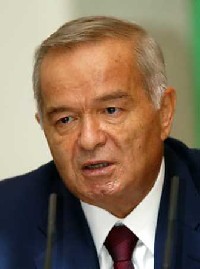
MOSCOW AND WASHINGTON PURSUE DIVERGING POLICIES IN UZBEKISTAN, CENTRAL ASIA
Publication: Eurasia Daily Monitor Volume: 2 Issue: 118
By:

Securing stability in the volatile region of Central Asia is a paramount strategic interest of both Russia and the United States. But following violent unrest in eastern Uzbekistan, Moscow and Washington seem to differ over how to maintain stability in the vast, restive area ruled by authoritarian and oppressive regimes. While the Kremlin holds that preserving the precarious status quo is the best possible recipe, some top officials in the Bush administration tend to increasingly view the region’s thuggish rulers as part of the problem rather than part of the solution.
A number of noted Central Asia experts, such as the Pakistan-based analyst Ahmed Rashid, have long criticized the West in general and the United States in particular for enabling Uzbekistan President Islam Karimov’s authoritarian rule. But now there are some signs that a kind of policy reevaluation is under way in Washington. It would appear there is a growing understanding, highlighted by several influential American commentators, that the “character of the Karimov regime can no longer be ignored in deference to the strategic usefulness of Uzbekistan.”
Indeed, many security experts in both countries saw the American-Uzbek “strategic partnership” forged in March 2002 as effective geostrategic leverage helping balance Russia and China in the region. The Karimov government, however, strongly resisted attempts to use the “alliance” for promoting liberal reforms and human rights. Having suppressed the recent riots, which he asserted were the result of an attack by “external radical Islamist forces,” Karimov promptly revived the “strategic partnership” with Moscow and received a red-carpet welcome in Beijing.
At the same time, the U.S. State Department has steadily increased its criticism of Uzbek actions, pressuring Tashkent to permit an international inquiry into its crackdown in the Fergana Valley. On June 14, State Department spokesman Sean McCormack said that Secretary of State Condoleezza Rice had written to Karimov to express the U.S. position on violence in Andijan. He also denied media reports of a policy split between the State Department and Defense Department, adding, “We are speaking with one voice with respect to this issue.” The long-standing U.S. position on Uzbekistan, McCormack specifically stressed, is that it must improve its human rights record to find lasting security.
In contrast, Russia fully backed Karimov, saying there is no need for an international investigation of what happened in Andijan — a position most recently expressed by Defense Minister Sergei Ivanov at the June 9 Brussels NATO meeting.
Remarkably, on June 10, President Karimov met in Tashkent with a delegation of Kremlin-connected political analysts led by Politika foundation head Vyacheslav Nikonov. The group also included Sergei Markov, director of the Center for Political Studies; Vitaly Tretyakov, editor-in-chief of the magazine Politichesky klass; Rafael Guseinov, first deputy editor-in-chief of the newspaper Trud; and Nurali Latypov, an adviser to Moscow Mayor Yuri Luzhkov. The true goal of the Russian pundits’ visit was quite clearly revealed by Karimov himself. Noting that Uzbekistan is currently under an “information attack,” the Uzbek strongman told his Russian guests, “I am confident in your unbiased and objective evaluation of the issues.” The Kremlin spin-doctors did not let Karimov down. After a tour of Andijan, Nikonov told the official Uzbek news agency UzA, “The numbers of victims of the tragic events in Andijan that some foreign media have provided are clearly exaggerated.”
In his analysis of the Andijan events published in the government daily Rossiiskaya gazeta (June 16), Tretyakov characterized the incident as a “well prepared armed mutiny” organized “mostly from abroad.” He argued that the local populace did not support the rebels and that thus there was neither the massive “shooting at the peaceful rally,” nor “hundreds and thousands of deaths among the civilians.” He endorsed the official death toll, saying that the figures provided by the Uzbek authorities “are very close to reality.” In general, the actions of Islam Karimov and his subordinates in Andijan were both adequate and necessary, Tretyakov concluded.
It would appear that most Kremlin strategists tend to look at Central Asia exclusively through a geopolitical lens, fearing that any regime change in the region is a zero-sum game, inevitably leading to the strengthening of American positions in what is usually called Russia’s soft underbelly. It is symptomatic that in a policy paper penned even before his trip to Uzbekistan, Nikonov noted with satisfaction that Uzbekistan has turned out to be the first country in the post-Soviet space where an attempt at a “velvet revolution” had failed. “The government resorted to force and stopped — at least for the time being — the development of the revolutionary process,” Nikonov wrote.
Within such conceptual framework, it is only logical to believe, as many Russian policymakers do, that Moscow will benefit most from the preservation of the status quo in Uzbekistan. “I think that after the Andijan events Tashkent will become one of Moscow’s main geopolitical partners in Central Asia,” says Mikhail Margelov, head of the Federation Council Committee on Foreign Affairs.
(Eurasianet.org, May 17; Parlamentskaya gazeta, May 18; Trud, May 28; Weekly Standard, June 6; Washington Post, June 14, 15; RFE/RL, June 15; Rossiiskaya gazeta, June 16)




